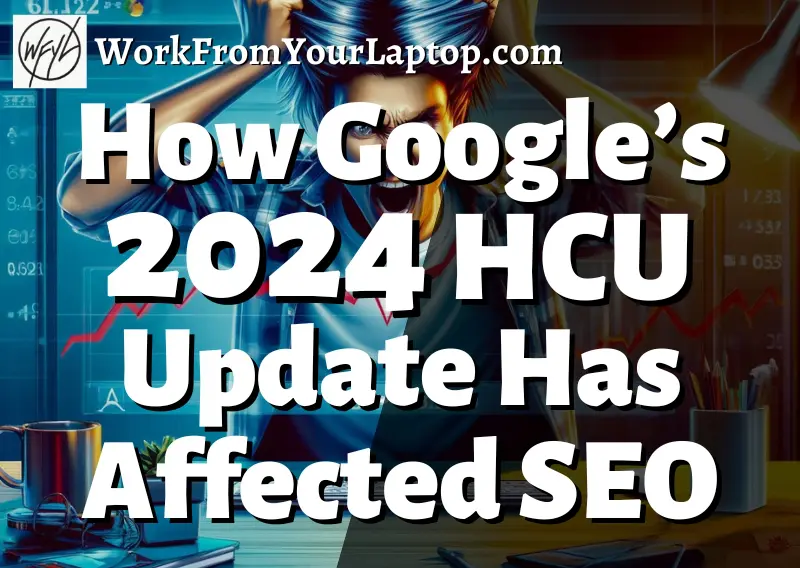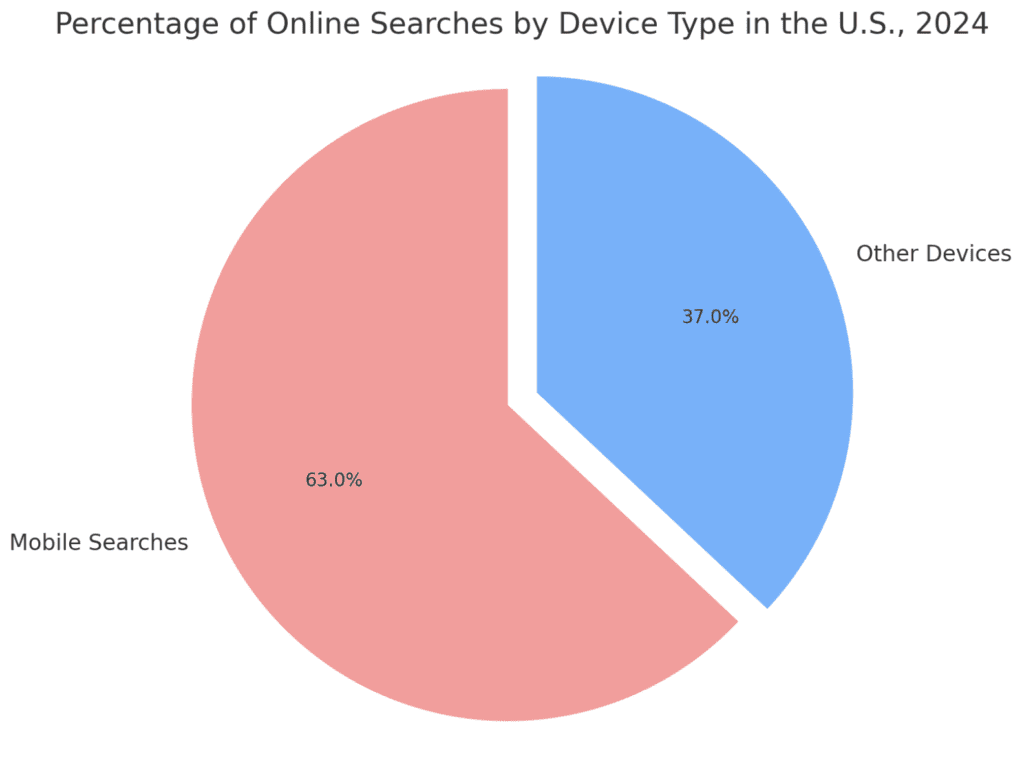Last updated on August 8, 2025 · In-depth guide, 5–7 min read

The Google Helpful Content Update (HCU) has been a hot topic in the world of SEO (Search Engine Optimization) since its release. This update has had a significant impact on search engine traffic, and impacted how we view SEO.
How Has the 2024 Google HCU Impacted SEO?
The 2024 Google HCU update has turned SEO on its head, prioritizing content written for people instead of search engines and featuring UGC (user-generated content) at the top of the SERPS. There is less focus on keyword placement and more on search intent.
Overview of Google HCU
The HCU is a core algorithm update that is intended to promote quality content and limit the search presence of content that is unhelpful or purposely written to satisfy search engine bots. The HCU has been rolled out in several updates since its launch in 2022, with the most recent update being released in March 2024.
With each update, Google has been tweaking its algorithm to better understand the intent behind searches being made. Google has elevated the significance of E-A-T (Experience, Authority, and Trustworthiness) qualities in content, and this has led to a noticeable shift towards more interactive and engaging content.
This update has also led to changes in keyword optimization, with Google favoring content that is written for humans rather than search engine crawlers. This has led to UGC (user-generated content) finding itself at the top of the SERPS (which many content creators aren’t happy about).
Another important aspect of the HCU is its emphasis on user experience. Google continues to pay careful attention to user engagement signals such as bounce rate, time on site, and click-through rate to determine the relevance and usefulness of content. Websites that provide a positive user experience and keep users engaged are more likely to rank higher in search results.
But what can we do if we feel we were creating solid content that is now lost in the abyss of the internet? Is SEO a total waste of time now? Or can we adapt our strategies and find a way to still rank?.
What is HCU’s Impact on SEO Ranking Factors?
Supposed Emphasis on Content Quality
With the HCU update, some content creators are pulling out their hair. Google states that quality has become a crucial ranking factor, however there are a ton of seemingly low-quality sites at the top of the SERPS, like Reddit and Quora.
The main factor here is that Google understands that user-generated content is created by humans asking other humans questions in forums. And there isn’t any keyword stuffing or gaming the system to rank. Apparently, Google loves this.
Unfortunately, the actual quality of Reddit and Quora and other UGC can be lower than the quality posts ranking below them. Still, websites must ensure that their content is informative, well-researched, and provides value to their audience, also focusing on creating content that is relevant and up-to-date.
User Experience Optimization
User experience has always been an essential factor in SEO. And with the HCU update, it’s supposed to hold even more value.. Websites must ensure that their users have a seamless and enjoyable experience while browsing their website. This includes fast loading times, easy navigation, and mobile responsiveness.
Websites must also focus on creating a visually appealing website that’s easy to read and navigate. The website should be optimized for different devices, including desktops, tablets, and smartphones. This helps improve the user experience and increase engagement.
Mobile Usability Emphasis
Mobile usability has become a crucial factor in SEO since the HCU update. Make sure your website is mobile-friendly! According to this website, mobile devices account for about 63% of online searches in the U.S.

What are the Changes to Keyword Optimization After the HCU?
Shift from Keyword Density to Relevance
With the introduction of the Helpful Content Update (HCU), Google has shifted its focus from keyword density to relevance. This means that websites that used to stuff their content with keywords to rank higher aren’t going to be seeing the light of day. Instead, Google now rewards websites that produce content that is relevant to the user’s search query.
To optimize for relevance, you need to understand the intent behind your audience’s search. This means doing solid keyword research and creating content that answers those searches. Google’s algorithms will recognize the relevance of the content and rank it higher in search results.
Long-Tail Keyword Strategy
Another change that the HCU has brought to keyword optimization is the importance of long-tail keywords. Long-tail keywords are phrases that are more specific and targeted than general keywords. For example, instead of targeting the keyword “shoes,” (this wouldn’t be a good focus keyword anyway, way too general), you should target the long-tail keyword “women’s running shoes” or even better “which women’s running shoes are recommended by pediatrists?”
Check out these stats on long-tail keywords:
- Prevalence: Long-tail keywords make up a significant portion of all search queries, with analytics indicating that as many as 91.8% of all search queries are long-tail keywords (Embryo).
- Conversion Rates: These keywords are known for their high conversion rates, averaging around 36%, which is significantly higher than the conversion rates of more general searches (The HOTH).
- Specificity and Targeting: Because they are more specific, long-tail keywords allow businesses to target niche markets more effectively. This specificity makes them easier to rank for and less expensive to target in advertising campaigns (Embryo).
- Search Volume and Competition: While long-tail keywords typically have lower search volumes, this also means they face less competition, making them an appealing option for businesses looking to optimize their SEO strategies (The HOTH).
The reason why long-tail keywords are important is that they are more likely to match the user’s search intent. And remember, with the HCU, Google is now prioritizing the user’s search intent over exact keyword matches.
How Should You Change Your SEO Strategy After the HCU?
Tracking the Important Google HCU Metrics
To effectively measure the impact of the HCU, you need to track those metrics that Google is placing more focus on like bounce rate, time on site, and conversion rate. By monitoring these metrics, you’ll be able to measure whether the HCU has positively or negatively impacted your site’s performance.
Evolution of SEO Reporting
SEO reports should now include information on page experience. This includes metrics such as page load speed, mobile-friendliness, security, and relevancy of content. As the HCU aims to promote helpful content and has a major focus on user experience, you have to make sure that your content is informative, engaging, and relevant to your target audience.
What are the New SEO Best Practices?
New Approaches to Content Creation
According to the HCU, the focus is on creating content that is informative, relevant, and useful to the user. As I showed at the top of the article though, there’s a slight disconnect here, because so many UGC forums are topping the SERPS.
That being said, focus on value. No keyword stuffing to game the system! Understand the search intent and deliver! Create content that is optimized for both the user and the search engines (but lean toward more toward the user). Use LSI keywords, high-quality visuals, and attention getting headings and subheadings to break up the content.
Technical SEO Adjustments
As mentioned above, with more and more users on mobile, one of the most significant changes is the need for websites to be mobile-friendly. Google has made it clear via the HCU that websites that are not mobile-friendly will not rank well.
Other technical SEO adjustments include improving website speed, using schema markup, and optimizing images. Website speed is critical, and Google has specifically stated that it’s a ranking factor. Schema markup is essential for providing search engines with additional information about your content, while optimizing images can help improve the user experience.
What is the HCU’s Effect on Local SEO?
Google’s Helpful Content Update has impacted local SEO as well. The HCU focuses on providing high-quality localized information to users, which means that businesses must invest more in their local SEO efforts to stay relevant.
To improve their local SEO, businesses should consider creating location-specific content that provides value to their local audience. Additionally, businesses should focus on optimizing their Google My Business (GMB) profile. This includes adding accurate and up-to-date information about the business, such as the address, phone number, and hours of operation.
Has the HCU Impacted Voice Search Optimization?
Along with the rise of AI comes voice search. More and more people are speaking to either GPT, Siri, Alexa or another AI assistant to get answers.
To optimize for voice search, websites should focus on answering specific questions that users may ask. This requires a different approach to keyword research and optimization. This again is a reason for long-tail keywords and conversational phrases becoming so much more important for voice search optimization.
Make sure your content is structured in a way that’s easy for voice assistants to understand. Use clear and concise language, break up content into easily digestible sections. Lists and tables can be particularly useful in this regard.
Ready to stop chasing advice and build something that works?
I owe all my success to this training. Trust me, it’s worth taking a look.
🎯 Click here to check out my full review.
Final Thoughts
If you understand where Google’s focus is you can make adjustments and use this opportunity to adapt your content to actually make it more helpful and deliver more value to your audience. Don’t pull your hair out and give up! Adapt and overcome!
What do you think? Did you lose a significant amount of traffic as a result of the recent HCU.? What have you done to adjust? Are you utilizing other mediums? Let me know in the comments section below! I’d love to hear your perspective and I always reply!
Frequently Asked Questions
What’s the best way to recover from the Google Helpful Content Update?
Start with a content audit, remove low-quality pages, target long-tail keywords, and optimize for voice search. Elevate E-E-A-T across all content to rebuild trust with search engines.
How can I stay compliant with Google’s E-E-A-T guidelines?
Focus on showcasing expertise in your niche, earning authoritative backlinks, and maintaining transparency and site security to build trust.
How did the Google Core Update change SEO?
It penalizes low-quality and overly optimized content, prioritizes user intent over keyword stuffing, and rewards content that performs well on mobile and voice search.
Still Hungry for Growth?
Dive Into These Handpicked Articles! ⬇️
- Why You Should Avoid Paid Ads as a Beginner
- How to Choose Your Niche as a Micro Influencer
- Alex Hormozi Review & Reality Check
- Micro-Influencer Affiliate Marketing: How to Start Small and Build a Real Online Business
- How To Use Affiliate Marketing Without A Website In 2025
- Attraction Marketing Formula Review (2025): Legit or Just Another MLM Trap?






Hi Eric,
Great article as always thanks and really easy to read and understand, I have a relatively new blog site and have been quite lucky that it actually seems to have improved in Google results since the HCU finished. I am still a bit concerned about the next batch of Google updates though and how I could be affected. Do you have any insights or ideas on what is coming next or when the next Google search update is due out? Should we be worried 🙂
Thanks for the info and please keep it coming
Pete
The Google updates are nothing to be afraid of. We have all kinds of routes to get our content to the masses. The key is to keep creating as much as possible 🙂 Thanks for the comment!
Eric,
Understanding Google’s updates is never an easy task. You always make everything so much easier to grasp.
I am a bit confused about one of Google’s specs, providing less of a presence for content that is purposely written to satisfy search engine bots, I understand that they want to filter out the unhelpful content, and thank goodness for that, but isn’t the goal to write content that satisfies the search engine bots for the best results?
I understand that you are not working for Google and are just explaining the update, but can you elaborate on that aspect? I always come to your site for the best advice and the most up-to-date information.
Thanks in advance Eric, you rock!!
Stacie
What they’re trying to avoid are content creators who are writing more for the bots and less for human audiences. The unintended result that comes from this, or atleast I’m assuming it’s unintended, is that forums like reddit and Quora end up at the top of the SERPS. Thanks for the comment!